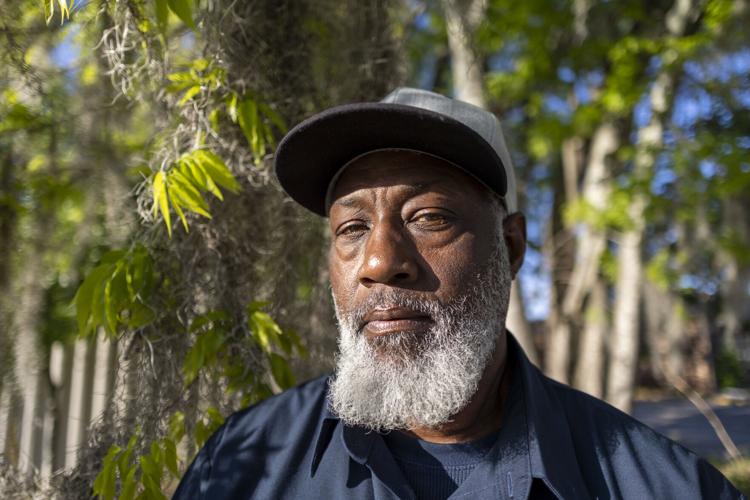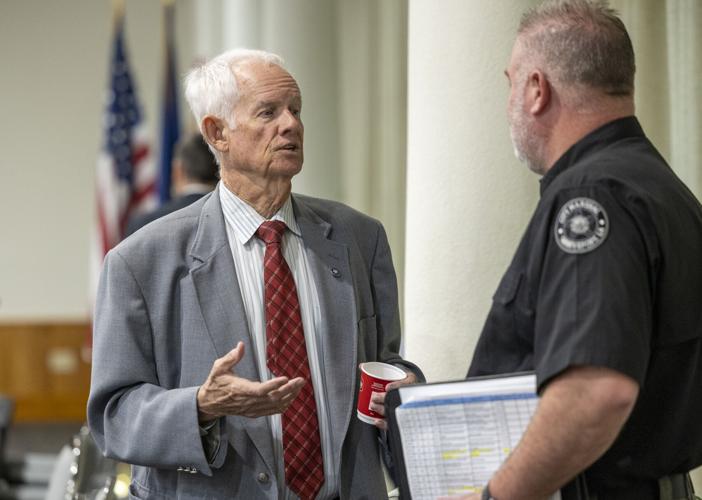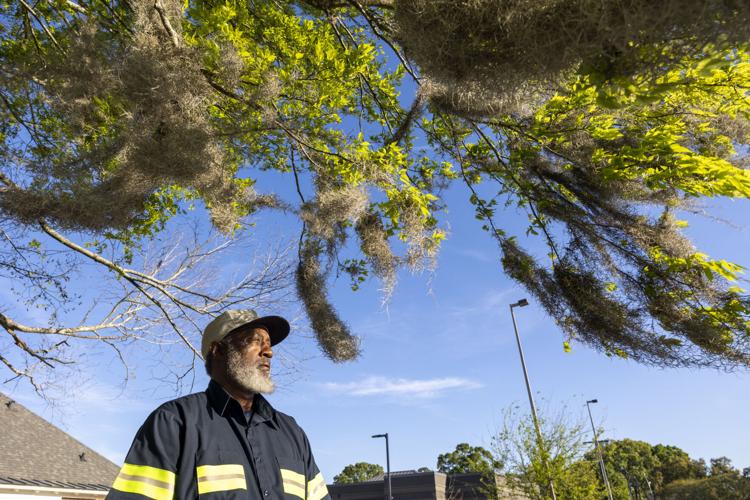A narcotics detective whose criminal history forced prosecutors to toss 60 drug arrests.

A deputy fired for stalking his ex-girlfriend, who then shifted to a new job where he racked up a stack of groping and excessive-force complaints.
An officer accused of two rapes, manhandling a teenager and shocking a handcuffed woman with a stun gun.
All three stayed in law enforcement in Louisiana, where abusive officers who violate the law have long been offered leniency over accountability. All three went on to commit more serious crimes on the job.
Other states regularly remove problem officers by permanently revoking their credentials, a process known as decertification. Allowing them to remain certified means that even when they lose one job, bad officers often simply join a neighboring department.
Georgia, on average, decertifies about 800 officers a year. Louisiana, by comparison, has averaged about one a year for the last half-century, though the pace has sped up slightly in recent years.
The newspaper identified officers in 39 parishes who were convicted of serious crimes but have not had their licenses revoked.
Here, oversight boards for other occupations are far more proactive: State officials are allowed to conduct their own investigations into misconduct among licensed plumbers, veterinarians and funeral directors, but not police.
Records show at least 228 law enforcement officers in the last decade were convicted of — or lost their jobs over — offenses including violence or harassment, dishonesty, theft, sexual assault or indecency, malfeasance and other serious on-the-job misconduct. But Louisiana’s threshold for decertification is so high that only 1 in 5 have lost their credentials.
Lawmakers attempted to fix Louisiana’s slipshod system of police accountability in 2017. But the remedy was weak.
They broadened the range of offenses that the state’s Peace Officer Standards and Training Council can cite for decertification, including excessive force and domestic violence. But they did not direct the board to do so, and they gave the undermanned board no new resources or authority.
As a result, almost nothing has changed: Just three officers in six years have been decertified through the updated rules.

Ronal Serpas, a former New Orleans police superintendent, said the lack of accountability is an insult to the vast majority of the state’s roughly 23,000 law enforcement officers.
“The 9 out of 10 officers who want to get it right don’t want those officers around either,” said Serpas, now a criminal justice professor at Loyola University. “They make it dangerous to be around them, to do their job and they make it more difficult to go home safely.”
POST continues to decertify under its older rules, which require felony convictions. And even then, the agency is doing so cautiously. It has revoked credentials from only a third of the officers referred for decertification in the past five years.
Officials said they haven’t acted on the rest because most involve pending court cases or charges reduced from felonies.
“Everybody thinks all of this stuff should happen immediately and almost overnight,” said Jim Craft, executive director of the Louisiana Commission on Law Enforcement, which oversees POST. “All over the country, police officers get their jobs back every day because an agency jumped too soon or moved too fast.”
To better understand this system, The Times-Picayune | The Advocate reviewed more than 9,000 pages of POST records, court documents, internal police files, news articles and minutes from civil service board meetings.
Among the findings:
- At least 134 law enforcement officers were convicted of crimes including murder, sexual assault or indecency, dishonesty, domestic violence or harassment, theft, excessive force and other on-the-job malfeasance in the last decade. The vast majority were convicted of felonies, which requires decertification under the law. But only around a third have lost their accreditation.
- Another 328 officers in the last decade were fired for cause or resigned under investigation. Records show more than a quarter of those cases involved violence, dishonesty, sexual misconduct or malfeasance. But because they didn't involve felony cases, not one has been decertified.
- For at least 89 of those separations involving serious offenses, the law required local departments to report the officers to POST. But without penalties for skirting that mandate, just over half of the cases were reported.
- Among the cops with a firing or criminal conviction on their record, at least 29 appear to still be on the job, though the records that local departments are required to share with POST are so limited that the agency acknowledged the number may be higher.

Jim Craft, center, executive director of the Louisiana Commission on Law Enforcement, talks with law enforcement agents and staff during an LCLE meeting in Port Allen on Thursday, March 30, 2023. (Photo by Chris Granger | The Times-Picayune | The New Orleans Advocate)
For Matthew Hickman, a criminal justice professor at Seattle University who has studied police decertification around the country, there’s a clear conclusion. “This has been a failure,” Hickman said.
The newspaper shared its findings with Attorney General Jeff Landry, who sits on the 12-member POST Council that has the final say on decertifications presented by POST staff.
In a brief statement, Landry — a leading Republican candidate for governor — called the information “alarming.” However, he didn’t respond to follow-up questions on what changes he’d support, or why the council has done little to purge bad officers.
Decertification is just one facet of POST’s work. The agency’s four employees are responsible for a long list of duties that in similar states are handled by teams numbering in the dozens.
The agency’s work may be more important now than ever. Police chiefs and sheriffs across the state decry the difficulty in recruiting or retaining qualified officers, which they say partly owes to an uptick in negative perceptions of law enforcement.
Georgia gives state oversight officials the authority to investigate police on their own and hand down permanent bans for a wide range of offenses.
“I can tell you that the good law enforcement officers across the state want justice for our citizens and for them,” said Livingston Parish Sheriff Jason Ard, who also chairs the POST Council. “The bad ones — as in any profession — give the rest of us a bad rap.”
Nora Ahmed, legal director of ACLU of Louisiana, said the end results have another impact: the perception in some communities that police operate with impunity.
“Decertification in Louisiana,” she said, “is nothing more than a mirage.”
Limited tools
In the 40 years between POST’s founding and the 2016 killing of Alton Sterling by a Baton Rouge officer, Louisiana almost never decertified police.
Just six officers were stripped of their POST credentials during that span — even though the investigation into the Danziger Bridge shootings in 2005 alone, to take one example, led to felony convictions of 10 New Orleans officers. Though none of those officers appear to be actively employed, none of them were decertified. Neither was Blane Salamoni, who killed Sterling, but was cleared of criminal charges.
In 2017, the Legislature sought to extend decertification beyond felons. The reforms allow — but don’t require — POST to strip the credentials of officers convicted of misdemeanor domestic battery or fired for using excessive force.

State Rep. Randal Gaines, who wrote the changes, acknowledged that the law is weak.
“We thought it would give them the incentive to decertify more officers,” said Gaines, a LaPlace Democrat. “Obviously, it hasn’t done that.”
He said the powerful state Fraternal Order of Police — which represents rank-and-file officers — succeeded in watering down his bill. That group’s president, Darrell Basco, declined to be interviewed, but in an emailed statement said the organization has “always advocated that good cops don’t like bad cops.”
“As long as there is a process for decertification, including a fair hearing for decertification, we do not have an issue,” Basco said.
For Serpas, the law has another glaring flaw: It doesn’t address decertifying dishonest officers. Hickman, the criminal justice professor, said that’s among the most commonly cited offenses in other states’ laws, because a cop without credibility becomes useless to prosecutors bringing cases.
Serpas said accountability starts with requiring officers to tell the truth. He imposed a rigid standard for honesty in New Orleans that he called “you lie, you die.”
That standard, adopted in 2010, has since been dropped at NOPD.
“If they don’t suffer sanctions for not telling the truth, it’s hard to find out about use of force, about civil rights violations — the things the Legislature added,” Serpas said.
Convicted and undetected
POST relies almost entirely on reports from local departments. Beyond that, the agency’s director, Bob Wertz, 74, keeps an accordion folder stuffed with news clippings about officers in trouble.
“If they’re on the news, I’ll send myself a note,” Wertz said.
The system is far from foolproof. Swaths of Louisiana go uncovered by the news media. And although a 2021 law added $500-a-day fines for departments who fail to report fired officers, the agency has yet to issue its first one.
Police agencies are also required to notify POST when an officer is facing criminal charges — unless the officer is already out the door, as is often the case. And the requirement only applies to criminal cases that stem from on-duty behavior.
POST officials say the process can also lag because the agency must wait until officers exhaust appeals.

Bob Wertz, left, with Peace Officer Standards & Training, at a POST Council meeting in Port Allen on Thursday, March 30, 2023. (Photo by Chris Granger | The Times-Picayune | The New Orleans Advocate)
To locate cases POST missed, The Times-Picayune | The Advocate reviewed news articles and online court filings, and sent more than 200 records requests to sheriffs, prosecutors and police departments across the state. The newspaper also mined a database of complaints against law enforcement officers made public by Innocence Project New Orleans.
The newspaper identified officers in 39 parishes who were convicted of serious crimes but have not had their licenses revoked.
They include officers who have battered women, molested children and instigated racist attacks on Hispanic and Black people; officers who used their positions to stalk ex-partners and steal drugs; even a few convicted of rape and manslaughter.
POST officials say many of these offenders end up being weeded out of law enforcement anyway, because they forfeit their gun rights or their training requirements lapse.
In these cases, devoting staff time to work on decertification may not be necessary, said Ponchatoula Police Chief Bry Layrisson, who also sits on the POST Council.
“Why are we wasting taxpayers’ money if they’re obviously never going to work in law enforcement again?” Layrisson said.
Hickman said that attitude runs counter to a key tenet of decertification: to ensure history doesn’t repeat itself.
“That’s a very sad perspective: ‘We’re missing these guys who may have been convicted, but eventually things will catch up with them,’ ” he said. “That’s not accountability. That’s wishful thinking.”
'More than enough'
State Rep. Tony Bacala, a Republican from Prairieville who spent nearly 40 years as a sheriff’s deputy, maintains the Legislature has done its part. His 2021 law allows POST to expand the criteria for decertification on its own and immediately suspend those who may qualify.
POST has yet to take that step and hasn’t added any decertification rules.
Meanwhile, offenders who have avoided felony convictions have continued to slip through the cracks.

Law enforcement agents and staff from across the state attend a POST meeting in Port Allen on Thursday, March 30, 2023. (Photo by Chris Granger | The Times-Picayune | The New Orleans Advocate)
Pineville police Officer Terry Bradshaw was indicted in 2017 on charges that he coerced a woman into sex on the job. He pleaded guilty to simple battery in 2019. He hasn’t been decertified. His lawyer didn’t return messages.
In 2021, Jackson Town Marshal Travis “Clay” Depew turned himself in on charges that he attacked an unarmed Black teenager while attempting to clear a crowd in a gas station parking lot. Depew had previously been fired for stalking his ex and had racked up a stack of complaints alleging groping and excessive force.

In the latest case, Depew was accused of choking the teen and calling him the N-word. A fellow officer had to intervene, and two witnesses testified they heard Depew ask the teen, “Do you want to fight?”
A malfeasance charge led to a hung jury, before a district judge convicted Depew of simple battery in January. Depew’s criminal attorney, John McLindon, said Depew denied using a slur.
For Ron Haley, an attorney for the teen’s family, POST has ample evidence to strip Depew of his credentials.
“That’s more than enough,” Haley said.
Wertz disagrees.
“We would want to have more to send to the POST council,” Wertz said.
Depew remains on patrol in Jackson, the department's deputy chief said. Jackson Chief Fred Allen didn’t return messages.
New laws, same system
The upshot is that the results of Louisiana's process for decertification today are almost identical to those in years past, when POST hardly ever stripped problematic officers of their badges.
Cops who get into trouble at one agency often end up at small departments in rural areas, where low pay in less-desirable locations makes it difficult for sheriffs and police chiefs to retain qualified officers, said Craft, the LCLE director.
Basco, the FOP president, said the problems with recruiting and retention are only made worse when police make the news for the wrong reasons.

A roadside memorial cross on Monday, March 20, 2023 at the spot where six-year-old Jeremy Mardis was shot and killed by Marksville police in 2015. (Photo by Chris Granger | The Times-Picayune | The New Orleans Advocate)
“Who is left to police?” Basco said. “I’m going to bet it’s not one that you would want to show up at your house when you call for help.”
For residents, the consequences can be devastating.
In Plaquemines Parish, Deputy Elijah Gary had a violent history with a girlfriend, including a battery conviction and a restraining order violation. That presented credibility problems for local prosecutors, forcing them to drop 60 cases he worked on in a major drug sting.
But because Gary never faced felony charges, he never risked losing his license.
In 2013, he was booked on charges that he forced a shackled woman into a jail bathroom and sexually assaulted her. He pleaded guilty, and Plaquemines Parish taxpayers paid $48,000 to settle the woman’s lawsuit. An attorney for Gary declined to comment. In the civil case, Gary’s lawyers argued the encounter was consensual.
The sheriff at the time, Lonnie Greco, said he was unaware of Gary’s history when he took office in 2012. He fired Gary after the arrest. Greco’s predecessor, Jiff Hingle, who served time in prison after a corruption conviction, died in 2018.

Derrick Stafford, one of two deputy Marksville city marshals charged with second-degree murder in the shooting death of Jeremy Mardis, a 6-year-old autistic boy, arrives at the Avoyelles Parish Courthouse in Marksville for trial on Thursday, March 23, 2017. (Photo by Brett Duke, Nola.com | The Times-Picayune)
An officer near Alexandria, Derrick Stafford, was indicted in 2011 on charges that he raped two women in separate incidents. His fellow officer at the Marksville city marshal’s office, Norris Greenhouse Jr., had previously been fired from the Avoyelles Parish Sheriff’s Office after an investigation found he solicited nude photos from a teenage girl and visited with her while in uniform.
Greenhouse — whose father was a senior Avoyelles Parish prosecutor — never faced criminal charges. The case against Stafford was “viable,” said prosecutor Monique Metoyer — now with the Caddo Parish District Attorney's Office — but the charges were dropped for reasons she said she couldn’t discuss.
Greenhouse and Stafford went on to be accused of excessive force in at least five cases, including a woman who said Stafford shocked her with a stun gun while she was handcuffed, and a teenage girl who alleged in a lawsuit that he broke her arm.
Finally, after a 2015 traffic pursuit, the pair shot at an unarmed man and his son, killing 6-year-old Jeremy Mardis.
It should never have come to that, said Matthew Derbes, the lead prosecutor on the case.

“The Mardis situation doesn’t happen if Stafford doesn’t have POST certification, period,” said Derbes, now chief of trials at the Orleans Parish District Attorney's Office. “That’s an extreme example of somebody who shouldn’t have a gun and a badge with a gun and a badge.”
Stafford was sentenced to 40 years for manslaughter. His POST certification has lapsed while he's behind bars, though it has not been permanently revoked.
A lawyer for Stafford didn’t return messages seeking comment, and a corrections spokesman declined to allow a reporter to interview him. Stafford didn’t reply to an email and a letter sent to him in prison.
A lawyer for Greenhouse said the officer was defending himself because Mardis' father, Christopher Few, had backed his vehicle toward police.
Greenhouse was convicted of negligent homicide and malfeasance, along with a condition from the judge that Greenhouse surrender his law enforcement license.
That message was apparently never delivered to POST: He still hasn’t been decertified.
He was released from prison in 2019.













